|
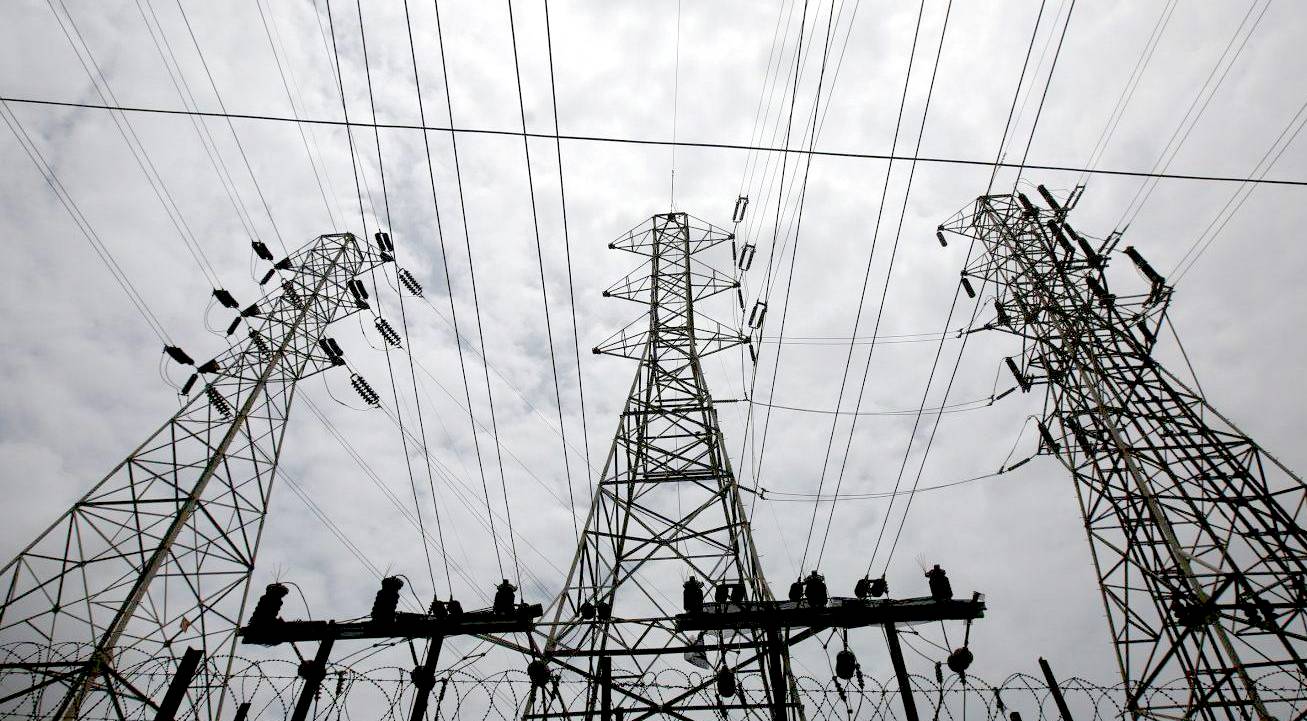
THE
NEEDLE IS STUCK - The move to alternative energy storage, could provide
us with uninterruptible power supplies, as Smarter service stations, level
loads and cut in when the national grid lets locals down. SmarNet is one system that
caters for energy storage in many chemistries, all under one roof: ammonia,
hydrogen,
lithium, methanol.
In the modern age of electricity, we are concerned that storms leave many
vulnerable and elderly without power.
Governments in more than 100 countries
moved thousands of state-owned businesses to the private sector. Airlines, railroads, postal services, electric utilities, and many other types of businesses valued at more than $3.3 trillion have
been privatized over the last three decades (Megginson 2015).
The revolution was launched by Margaret
Thatcher, British prime minister from 1979 to 1990. She came to power
determined to revive the stagnant British economy with market-based reforms. Her government deregulated, cut
marginal tax rates, repealed exchange controls, and tamed militant labor unions.
Margaret Thatcher was elected
Conservative Party leader in 1975, and her party gained a parliamentary majority in
1979. Prime Minister Thatcher came into office promising to “denationalize” the government-dominated economy
With the economy recovering in the early 1980s, and with Thatcher reelected with a large majority in 1983, the British
privatization program kicked into high gear. Campaigning in 1983, the Conservatives promised widespread
privatizations, and that created a strong mandate for them to move boldly after their landslide election
victory.
Thatcher had a strong personal belief in privatization. Privatization was crucial for “reversing the corrosive and
corrupting effects of socialism,” she said, and central to “reclaiming territory for freedom” (Thatcher 1993: 676). The
purpose of privatization was to ensure:
“the state’s power is reduced and the power of the people enhanced.”
Nothing could have been further from the truth. Her real agenda was to disarm the electorate and enslave them,
Thatcher was riding on a short-termist wave of instant fixes that seemed to the voting public to be
buoying up the British economy. All the while she was massaging the
figures, to make herself and her party appear successful. In the process
milking the poor to benefit the rich who were backing her party with
political donations. Granted, that state owned industries need to be
well managed, to cut the slack. But giving away a national asset, is
rather a drastic solution to resolving an efficiency problem. It's like
getting in a baby-sitter on a permanent basis. A sitter who steadily
ramps up their charges, but fails to take care of the baby.
The Poll Tax was the ultimate insult for people with no homes. Having sold off social housing stocks with no means of replenishing
affordable homes, she then set about taxing them for not having a home -
for sleeping on the streets. So blinded was Thatcher as to the absurdity
of her policies, that she really thought she could keep on squeezing
those in society she had discarded. And they would just take it up the
rear, without a murmur.
May
the Iron Lady rust in peace.
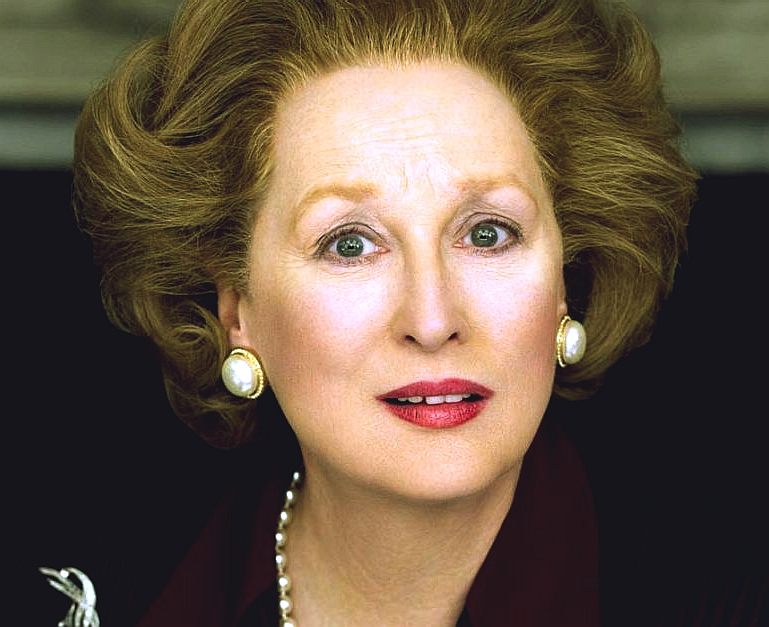
DEMON
POLITICIAN - "Did I do something wrong? I though slavery and
enslavement was the British thing. We used to steal land in far off
places and plunder ships on the high seas as a privatised franchise of privateers.
I feel bad about that, but apparently not the Queen,
who refused to apologise for our slave trading past. I thought it was
time to give away our nation to foreigners, to as it were, repay the
world for putting up with our Colonial bullying. I thought nobody would
mind, and I may get elected again, or at least my lovely party. Nobody
seemed to mind the increasing National Debt, as I borrowed more and
more. Every party does it."
BBC NEWS - 30 DECEMBER 2016 -
NATIONAL ARCHIVES: THATCHER'S POLL TAX MISCALCULATION
It was Margaret Thatcher's biggest political misjudgement - and brought her career as prime minister to an ignominious end.
The poll tax (or community charge) was supposed to make local council finance fairer and more accountable. Instead it triggered civil disobedience and riots and a rebellion in the Conservative Party.
Cabinet papers for 1989 and 1990, released today at the National Archives in Kew, reveal the reaction to the crisis at the heart of government. They show how involved the prime minister herself was.
And they pinpoint the moment it dawned on her that her flagship policy had turned into a political disaster which was hitting, not Labour local councils, but her natural supporters.
The size of the files alone - there are nine thick manila folders compiled over 18 months - are evidence of how far the poll tax dominated government thinking. Mark Dunton, a specialist in modern records at the National Archives, calls it a "juggernaut".
Though simple in principle the tax proved to be immensely complex in practice. The files are full of highly technical papers - many of them annotated by Mrs Thatcher.
They also include a warning from April 1989 that she risked a fine if she didn't complete her own registration form on time.
But the technical challenges of introducing the tax paled beside the political problems it threw up.
The government had expected opposition to a measure specifically targeted at high-spending, mainly
Labour-controlled, councils. What they hadn't expected was the reaction from their own supporters, as the April 1990 date for its introduction in England and Wales drew near.
In September the previous year her environment secretary, Chris Patten noted "a good deal of pressure developing" and Nigel Lawson, who was to resign as chancellor the following month, told Mrs Thatcher:
"We are faced with a potentially difficult Parliamentary situation."
By January, Patten was telling her there could be as many as 83 rebel MPs on the Tory benches. And she got a powerful sense of the anger among formerly loyal Conservative voters in March when a constituent of the Norfolk MP Ralph Howell wrote to her.
Mr WE Jones and his wife were in their 70s, living on modest pensions, and under the poll tax would be paying more than twice what they paid under the old system of rates, while better-off people in large houses would be paying less. He accused the prime minister of being uncaring.
"You have taken advantage of your position to impose your will upon us to the point where you are now virtually a
Dictator riding roughshod over anyone who opposes you," he wrote on 3 March.
In the files released today the couple's address has been redacted, though a later memo reveals they lived in a house called Dream of Delight in the village of Great Snoring.
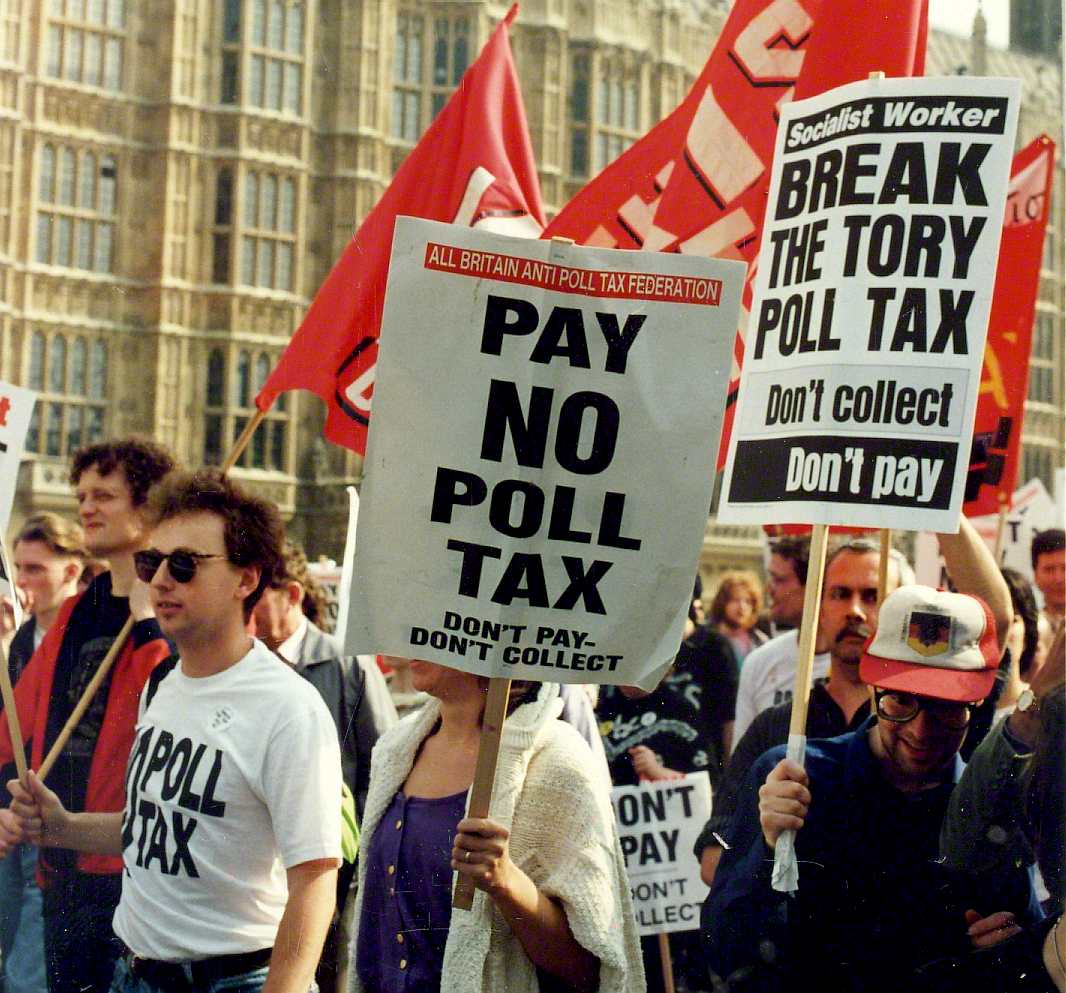
Howell asked for a meeting. The prime minister's adviser Mark Lennox-Boyd suggested he should be granted an audience: "The meeting will be a waste of time, but I am afraid she will have to do it to keep his frustration at bay."
Yet the files suggest it may not have been a waste of time, for this was the point when Mrs Thatcher finally realised that something must be done.
She turned not to her environment secretary Chris Patten, who had the job of bringing in the new tax, but to her recently-appointed chancellor,
John
Major. On 25 March (six days before an enormous demonstration against the poll tax in London which developed into serious rioting) the files contain a "note for the record" of a phone conversation between the two.
Instead of the tax shining a spotlight on spendthrift local
councils, she said, the government was getting the blame for high
charges, and the impact was falling on those in middle income groups, what she called the "conscientious middle".
Major agreed with the need for what he called a "radical review" to find a way to cap charges and give
local authorities more money, but without increasing overall public expenditure.
Over the next two months the files reveal a succession of crisis meetings as ministers desperately tried to find a way out of their predicament, including the perceived unfairness of a system in which "Dukes and dustmen" both paid the same.
One idea was to raise more money. Should councils be allowed to use cash from the sale of council houses to subsidise the poll tax? Or should people on higher incomes pay more? That idea was floated by the prime minister herself in an unusual signed "personal minute" to Major on 9 April.
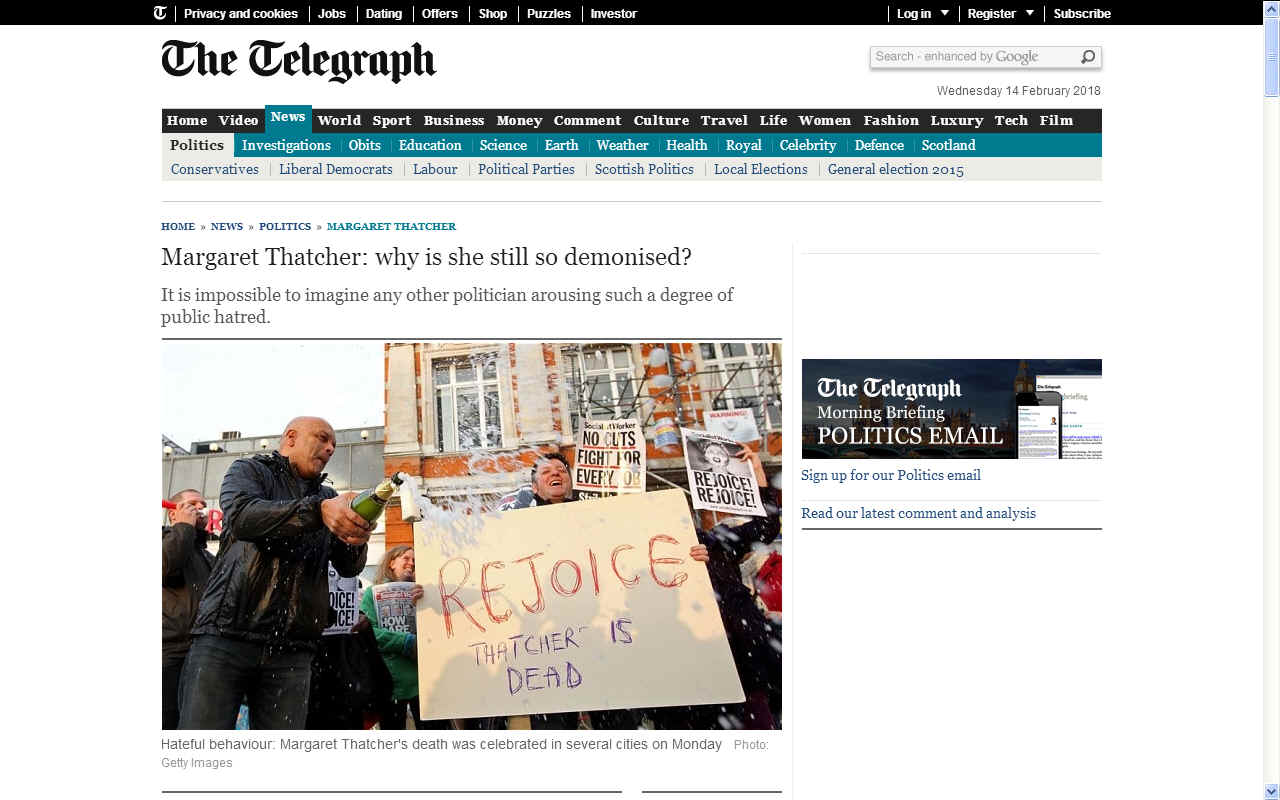
THE TELEGRAPH APRIL 2013 - MARGARET THATCHER: WHY IS SHE STILL SO
DEMONIZED ?
It is impossible to imagine any other politician arousing such a degree of public hatred.
Many time-honoured social conventions have been discarded in recent times in our headlong rush to demonstrate how modern and relaxed we have all become, but we still, more or less, stick to the maxim of “not speaking ill of the dead”. At least not in the immediate aftermath of their demise, when their families’ grief is still raw.
Yet news of the passing of the frail 87-year-old Baroness Thatcher, so confused that she had to be reminded almost daily that her husband was dead, was greeted with street parties in Brixton, Bristol, Leeds, Liverpool and Glasgow. In south London, the scene of rioting in 1981 during her first term in office, the letters on the billboard outside a cinema were rearranged by masked vandals to read “Margaret Thatchers dead LOL [Laugh Out Loud]”. In Glasgow’s George Square, revellers drank champagne, wore party hats and sang, “Ding, dong, the witch is dead”. In Leeds, they shared a celebration cake. In Liverpool they gathered for a “death party”, and in Bristol joined forces under the banner, “May she never RIP”.
Cold comfort, then, for her children, neither of them saints, but still human beings trying to absorb the loss of their mother. We all have a mother, so we should all have enough empathy to imagine a little of what they are feeling. But apparently not.
Of course, Margaret Thatcher, as a three times prime minister whose economic, political and social legacy remains alive and hotly disputed to this day, wasn’t any old mother. And so some, mainly on the political fringes, appear to regard her as such a hate figure that the normal rules of engagement don’t apply.
The most mainstream voice to be heard in this mob was that of Radio 4 regular Mark Steel, who tweeted: “what a terrible shame – that it wasn’t 87 years earlier.” In the chorus was Socialist Worker – circulation under 8,000 and admittedly probably not on order at Mark or Carol Thatcher’s newsagents – with a front-page mock-up of her tombstone and the word “Rejoice” in capital letters. (The editor was too busy yesterday to take a call asking for an explanation of the image.)
And there too, inevitably, was George Galloway MP, never one to mince words when he might make headlines, with: “May she burn in the hellfires.” It is, as far as I can remember, the first time a recently deceased figure has been pushed so publicly and unceremoniously into the medieval pit since the death in 2002 of the Moors Murderess, Myra Hindley.
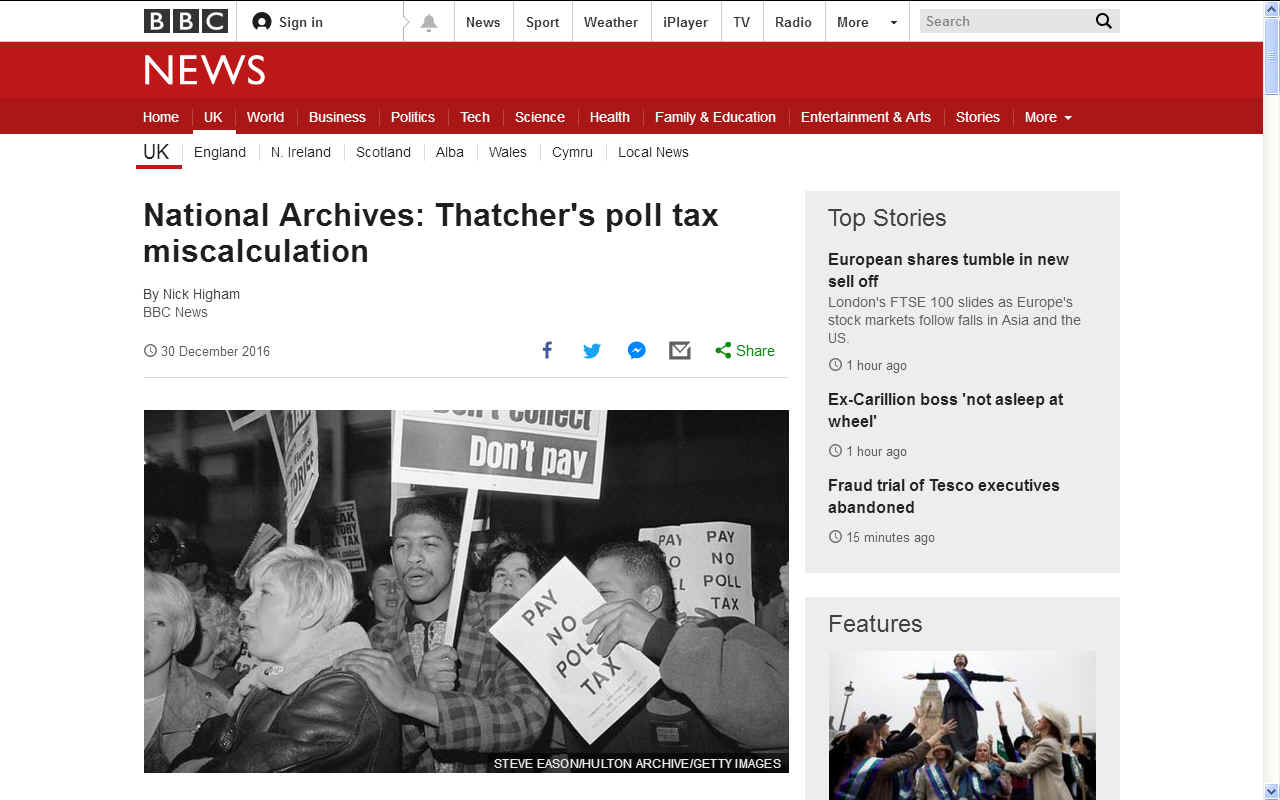
So has a line been crossed? There is an argument that says that, in life, Margaret Thatcher relished controversy, so why should we think she would object in death? As countless retired cabinet ministers, one-time opponents and commentators have remarked, she enjoyed a fight, adopted a presidential style that dispensed with distinctions between herself and her policies, wasn’t above flamboyantly rubbishing even close colleagues (notably Geoffrey Howe, albeit with disastrous consequences), and, in the words of her biographer the late Hugo Young, “cared little if people liked her”. Presumably in death she will care even less.
“The first thing to note,” says Oxford social anthropologist Kate Fox, author of Watching the English, “is that those celebrating so openly represented a tiny number. [Police estimates put the total nationwide at around 800.] A lot of people may have been thinking the same when they heard the news. I’m a typical lefty liberal and I certainly won’t be shedding any tears. But there is a difference between thinking it and shouting it on the streets or on social media in such a tasteless way.”
Fox also challenges the notion that the scenes in some of our largest cities on Monday night were anything new. “If we can cast our minds back before the era of 24-hour rolling news, these people were not the first to mark a death like this. I imagine the end of Richard III might well have been greeted by something similar.” In 1822 jeering was reported along the route of the funeral cortege of the deeply unpopular foreign secretary and Leader of the House of Commons Lord Castlereagh, although it is said that this was exaggerated by the radical press, forerunners perhaps of Socialist Worker.
Another curious feature of Monday night’s protesters was their age. Most were too young to have been alive when Margaret Thatcher was prime minister. Saul Adamczerwski, who carried a banner in Brixton reading “the bitch is dead”, explained to reporters: “She was so particularly evil and hated by everyone”. But he was two when she left office, so how does he know?
“It is likely that there was something going on that was about more than dislike of Mrs Thatcher,” suggests Kate Fox. “Indeed, I doubt if many of the young people there were even trying to make a serious point. There aren’t many opportunities for rioting and dancing in the street. They sensed this might be one. Anthropologists have a name for such moments – 'cultural remission’. The death of Mrs Thatcher legitimised their deviance because it was a time when the normal rules were briefly suspended.”
Others, though, see this outpouring of hatred as more focused. The comedian and actor Alexei Sayle grew up in Liverpool and has been an outspoken critic of the blight of unemployment and hopelessness visited on his city by the economic reforms of the Thatcher era.
“I personally am not interested in taking to the streets to celebrate her death,” he says.
“I don’t care enough to do that. Thatcher dying is less tragic than
David Cameron still being alive. But I understand the anger that people still feel about what she did, even if it can seem a bit incoherent after so many years.”
Among those trumpeting most unambiguously that they will not be mourning her passing have been representatives of the mining communities left redundant after the pit closures that followed the defeat of Arthur Scargill’s strike. Many still hold her responsible for their current economic woes. “I know some will say that they are just living in the past, trying to pin the blame on her rather than themselves,” Sayle says, “but it is hard not to live in the past when your future has been annihilated.”
However divisive her legacy, some aspects of her demonisation in the past 48 hours are extreme by any standards. The use of “witch” to describe her harks back to the medieval inquisition that targeted women as figures of hatred, and used the popular anger whipped up by such scapegoating to justify torture and murder.
Does such an outpouring of bile against an individual come more readily to those on the Left than those on the Right? Whatever the views of some activists, it is hard to imagine UKIP quite so shamelessly delighting in the demise of Jacques Delors, architect of all that they loathe and despise about the
European project.
Indeed, it is equally impossible to contemplate any politician, of whatever hue, from the grey generation that followed Margaret Thatcher – arguably another of her legacies – exciting such enduring hostility. The one contemporary name that might just stir enough animosity to allow Thatcher one day truly to rest in peace is that of the man she is reported to have regarded as her true heir –
Tony
Blair.
His legacy is equally divisive and Blair has one over her in that the visceral dislike of him seems to exist on Left and Right in politics. Still, it is hard to imagine that when the moment comes, news of his departure will be celebrated in the streets with cries of
“to hell in a hand cart with the warlock”.
A
SOLAR & WIND POWERED FUTURE -
Looking to a zero carbon world, where energy for life is available to
everyone at affordable prices, and transport does not contribute
significantly to global warming. These are part of the UN's Sustainability
Development Goals.
British Gas was privatised in 1986 under Margaret Thatcher's government, while the first parts of the electricity sector were privatised in late 1990, when the 12 regional electricity companies in England and Wales were sold.
Later, the Scottish industry was sold, as were the generating businesses National Power and Powergen and also the National Grid.
The National Grid's main business is moving electricity and gas around the country. This is known as transmission. The very last leg of the journey into people's homes and businesses - known as distribution - is done by a number of different companies.
It has been Labour Party policy since the 2017 election to take the transmission and distribution companies back into public ownership.
The party would then encourage the establishment of locally owned energy supply businesses to compete with the private sector suppliers, including the Big Six suppliers: British Gas, EDF, E.on, npower, Scottish Power and SSE.
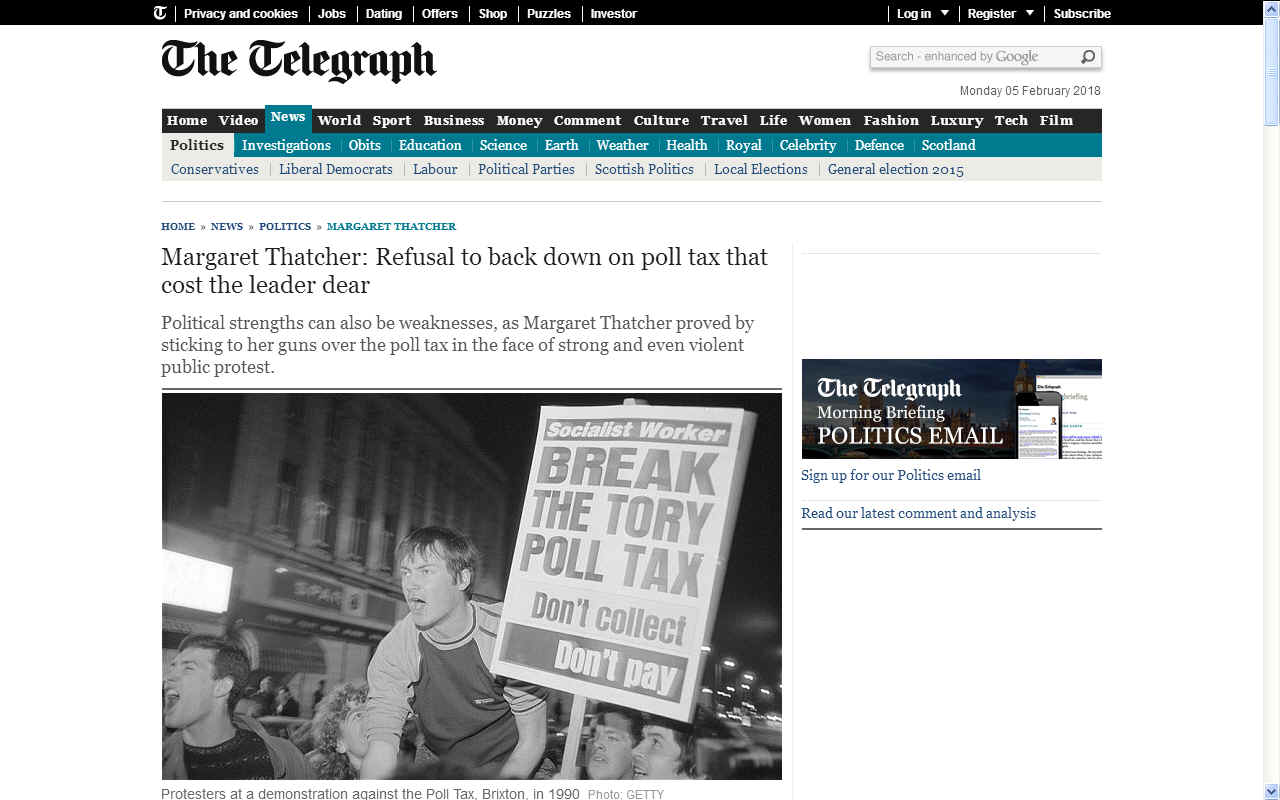
LINKS
& REFERENCE
https://
|





